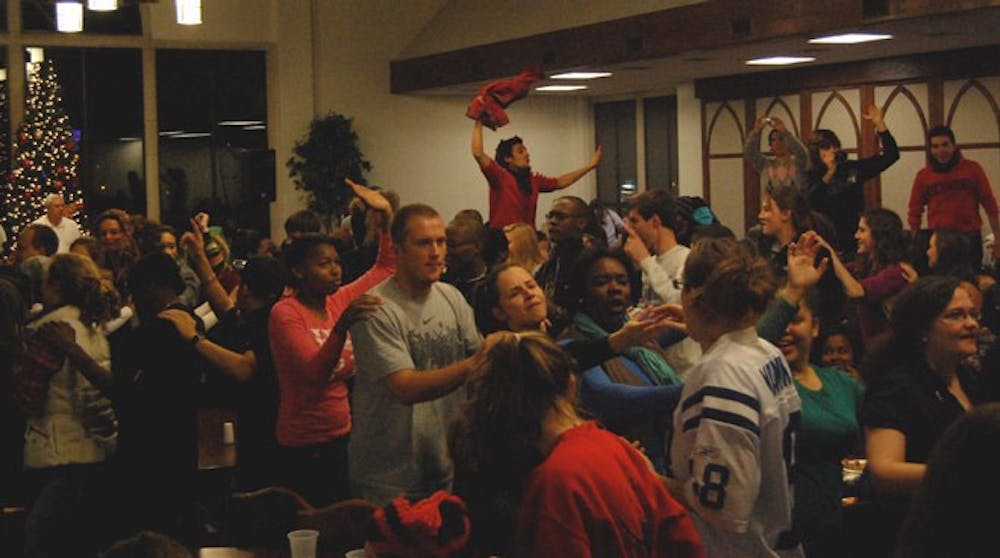The Sociology 306 class orchestrated the University of Richmond's first flash mob late last night at the Heilman Dining Center.
The purpose of the flash mob — a group who assembles suddenly in a public place to perform an action — was to encourage inclusivity on campus. The sociology students ignited a conga line, which quickly grew as other students joined. Gloria Estefan's "Conga" played as the expanding chain of singing and dancing students snaked around the tables in the middle section of the dining hall. The conga line aimed to shatter the tendency of students to segregate themselves in the dining hall based on race, sex and membership to Greek life, athletic teams and other student organizations, said junior Colleen Gwin, a member of the Social Change from a Global Perspective class.
Another class member, senior Lex Reynolds, said, "We separate by these tables, but when we join the conga line, we are linked together, representative of race, gender, creed, fraternity, sorority, sexuality."
Seniors Mycal Kelly, Rashad Lowery and international student Alejandro Seijas launched the conga line at 10:45 p.m. by acting out a poem, of which the last word was "dance." In addition to the conga line, students from and not from the class jumped onto tables, cheered and took pictures and videos. The ruckus continued for the next hour and 15 minutes.
A PowerPoint presentation played on the four computers that line the first room of the dining hall, with slides such as, "I had to dress more preppy to make friends," and, "In order to create diversity on campus, we must change the culture and not only increase the number of minorities."
Junior Elizabeth Hailand, who was not part of the flash mob, said it looked as if the school had gone mad from studying, but that the dancing seemed more spontaneous than part of any organized effort.
The sociology class began the flash mob as a reaction to the diversity statement in the Richmond Promise, the university's Strategic Plan for 2009-2014, Gwin said. One of the five commitments of the plan includes "an authentic culture of inclusivity that seeks and prizes diversity of experience, belief and thought," according to the Richmond Web site. President Edward Ayers had said during his annual State of the University address Oct. 26 that Richmond had been shattering the stereotype that it was homogeneous, according to an Oct. 27 Collegian article.
This year, compared with the freshman class of 2008, Richmond enrolled 124 more U.S. minority students, 91 more first-generation college students and 56 more students who grew up in a home where a language other than English was spoken, according to a graph distributed during faculty orientation.
But the members of the sociology class organized the flash mob because they thought little had actually changed, Reynolds said. Students have continued to talk to, befriend and dine with students who are like them.
"The promise states how diverse we are, which is the point of this [mob], to say we're not," Gwin said.
An article written by a journalism student in 2002 on the social segregation in the dining hall despite the recruitment of more diverse students illustrates that this has been a persistent issue, according to the Richmond Web site.
"Within the dining hall, there is the stereotype that the Greeks sat on the right side, the athletes sit in the middle, the academic students sit on the left and black and white students sit at different tables," the article reported.
Enjoy what you're reading?
Signup for our newsletter
The collective effort by a class that comprises students from different races, countries, sexes, religions, sororities, fraternities, athletic teams and with different physical abilities can set an example of real inclusivity, said two of the sociology classmates, Carter Blair, who plays soccer, and Richard Bagby, who is handicapped.
David Piacenti, the professor of the sociology class, said the excitement of the mob surprised him, but the dancing seemed to be isolated in the middle section of the dining hall. Students remained seated in the two other sections. But more important than the night's action will be the community's reading about the reason behind the mob, Piacenti said.
"You can make things change if you want to," Piacenti said.
The dining hall, which usually closes at 8 p.m., was open from 10 p.m. to midnight for Midnight Munchies, a study break for students before final exams begin Monday. The sociology class chose Midnight Munchies for the scene of its flash mob because of high student attendance during past years, Gwin said.
Jerry Clemmer, dining hall general manager, said Sunday was the best Midnight Munchies had ever been, as he watched students dance on tables. The study break's purpose is to let students blow off steam, which is fine as long as no one gets hurt, he said.
Contact staff writer Maura Bogue at maura.bogue@richmond.edu
Support independent student media
You can make a tax-deductible donation by clicking the button below, which takes you to our secure PayPal account. The page is set up to receive contributions in whatever amount you designate. We look forward to using the money we raise to further our mission of providing honest and accurate information to students, faculty, staff, alumni and others in the general public.
Donate Now


